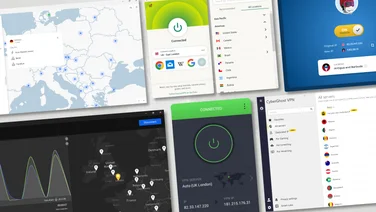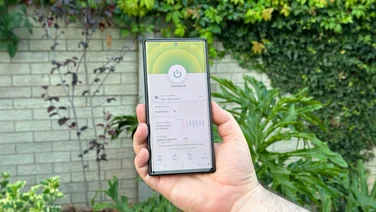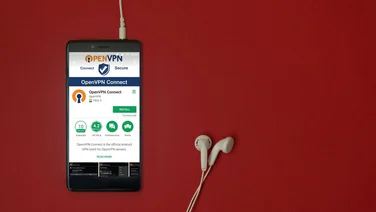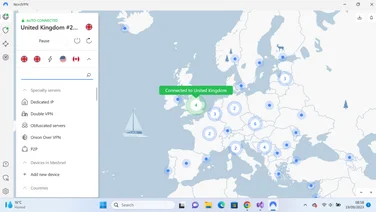To help us provide you with free impartial advice, we may earn a commission if you buy through links on our site. Learn more











- Connection can be extremely fast
- Swiss HQ is reassuring for privacy
- SOCKS5 proxy options for file sharing
- Didn’t reliably work with UK video sites
- Price goes up after initial subscription term
PrivadoVPN is a relative newcomer on the VPN scene, having launched in 2019. It has headquarters in famously privacy-friendly Switzerland, and offers a generous free plan that permits 10GB of secure VPN usage per month on a single device.
Unusually, there are no restrictions on using your free bandwidth for file sharing or video streaming, and free users can choose from 12 server locations including Brazil, Germany, Mexico, the UK and the US.
PrivadoVPN review: What do you get for the money?
If you want unlimited data and access to the full network of servers in 47 countries, you’ll need a paid account. These start at £11/mth, which is about par for the course: of all the VPNs we’ve tested, only Mullvad’s €5 deal is significantly cheaper on a month-by-month basis.
Sign up to Privado for a full year and the price tumbles. An “annual” subscription actually runs for 15 months for a cost of £45 – or a pretty reasonable £2.99/mth. Note though: after the initial term ends, the renewal cost rises to £60/yr, equivalent to £4.99/mth.The best-value option is a two-year subscription. This again comes with an extra three months, and at £54 it barely costs any more than a single year of service – bringing the effective price down to £1.99/mth. After that, it renews at £96 every 24 months, or £3.99/mth. But at that point you can always cancel and shop around for a new deal.
All paid subscriptions allow you to connect from up to ten devices at once, and dedicated apps are offered for Windows, macOS, Android, iOS and Amazon Fire TV devices. You can also set up the service on your router, or any OpenVPN-compatible device, using the supplied configuration details.
If you need help getting set up, or with anything else, the support area of the Privado website has a decent set of searchable help files, and you can create support tickets here to raise issues with agents. There’s also supposed to be a 24/7 live chat option for instant assistance, however when I tried to access this service I was told it wasn’t available owing to capacity issues.
READ NEXT: Best cheap VPNs
PrivadoVPN review: What’s it like to use?
The PrivadoVPN Windows application is a jaunty shade of indigo, and on first starting up it greets you with a quick tour of the interface. This is frankly unnecessary: the big, bright orange “Click to connect” button is impossible to miss, while below it the server selection and killswitch controls are self-explanatory.
The location page is just as easy to navigate. You can use the Search field to quickly find a particular country or city, or browse up and down the full list. By default this is sorted by latency, so you shouldn’t have to scroll far to find the fastest server that meets your needs. Specific locations can also be marked as favourites for convenient access – though getting to them isn’t as quick as you might hope, as you need to click into the server selection page, then click again on “Favourites” to see your saved servers.











The app includes a decent range of settings to tinker with. I like the way the killswitch can optionally leave LAN connections open while internet access is suspended. It’s interesting, too, that you can set the software to automatically connect to a random server – or a random one of your favourite servers – when it starts up.
There’s also a split-tunnelling feature called Smart Route. This is indeed smarter than many rival implementations, as it lets you route specific websites and IP addresses through the VPN. In this way you can trick (say) Netflix into thinking you’re in the US, while other browser tabs get the full speed of your direct ISP connection.
PrivadoVPN doesn’t tick every box when it comes to features: notably, it doesn’t support multi-hop routes for maximum obfuscation, and there’s no option to automatically enable the VPN when you connect to untrusted or specified networks.











On the plus side, skip onto the Privado website, and you’ll find a bonus feature called Privado Control Tower. This lets you use PrivadoVPN’s own secure DNS servers to optionally block ads, malware and social sites that you might not want your kids to access.
The Android app looks quite similar to the Windows software, but with more of a bluish hue. The connection and server selection buttons are still present, and there’s also a scrolling list of flags down the side of the screen. I was disappointed to find that tapping on a flag doesn’t connect you to that country – it just brings up the full server list pane, exactly as if you had tapped the main button. Still, the list itself is well implemented, with all the same features as the desktop app, including a search field, latency display and Favourites tab.
The Android client also largely replicates the settings available on Windows, with the killswitch, auto-connection and split tunnelling options all on hand. It isn’t quite the same, however: the mobile version doesn’t have the option to connect to a random server, and Smart Route on Android only works for entire apps, not individual web addresses.
Overall, whether you’re using the desktop or mobile client, PrivadoVPN offers a decent set of features that will meet most people’s needs.
PrivadoVPN review: How fast is it?
I normally start my VPN performance testing by connecting to a server that’s in the same city as me – the idea being that the shortest route should offer the best possible performance. To my surprise, though, PrivadoVPN recommended that the Johannesburg server would give me the best experience, so that’s where I began.
First, I used a Windows 11 laptop, connected to my router over Wi-Fi 6, served by a Hyperoptic gigabit internet line. With the VPN disconnected, the Google Speed Test tool reported an average download speed of 714Mbits/sec; after I activated the connection to South Africa, this fell to just 164Mbits/sec. That’s pretty good for a server five and a half thousand miles away, but is it really the best PrivadoVPN can do?
Of course it’s not. Switching to the London server more than quadrupled my download speeds to 691Mbits/sec. That’s a really excellent performance, indicating PrivadoVPN can keep up with even a very fast internet connection.
The VPN couldn’t quite replicate that performance when connected to the New York server: here, I saw an average of 276Mbits/sec. That’s more than fine for web browsing, streaming and so forth, but I couldn’t help noticing that it’s slower than the speeds I saw from NordVPN and ProtonVPN and Surfshark – even though those VPNs were all tested with a slower 350Mbits/sec broadband line.

I also tried out Privado’s performance on Android, using a Samsung Galaxy Tab S7 tablet. Here, with the VPN disabled, I saw an average download speed of 539Mbits/sec; activating a connection to the London server saw this fall to 265Mbits/sec, and switching to New York caused speeds to further drop to 147Mbits/sec.
Plainly, mobile performance isn’t as great as what I saw on Windows, but practically speaking there’s ample bandwidth here for most things you’re likely to be doing on a phone or tablet.
READ NEXT: Best Hulu VPNs
PrivadoVPN review: Is it good for video streaming and BitTorrent?
There’s no question that PrivadoVPN is fast enough to stream video – for watching 4K movies on Netflix and Disney+ the recommended minimum is just 25Mbits/sec.
When I tried unblocking geo-restricted content with PrivadoVPN, however, I had a mixed experience. First, the good news: connecting to Privado’s New York server instantly allowed me to watch US-only titles on Netflix and Disney+, and to log in and play shows and films on Hulu. This worked both in Chrome on my Windows 11 laptop, and using the respective Android apps on my tablet.











When I tried to watch UK content through the VPN, however, I didn’t have so much success. Although ITVX and Channel 4 played happily through the London server – on both my laptop and tablet – I had no luck in getting Now to work on either platform. Nor was I able to watch BBC iPlayer on my laptop.
After a little experimentation, I did find I was able to watch iPlayer on my tablet (but not my laptop) by switching servers from London to Manchester. Since those are the only two UK locations currently offered by PrivadoVPN, however, this isn’t entirely reassuring. If I were hoping to use a VPN to keep up with UK media while abroad, I’d feel happier using a service such as ExpressVPN, ProtonVPN, StrongVPN, Surfshark or Windscribe – all of which achieved a clean sweep in our streaming tests.
Conversely, if I were choosing a VPN primarily for file sharing, PrivadoVPN would be high on my list. Not only does it allow BitTorrent connections on all servers, it operates more than 60 SOCKS5 proxies around the world, and provides configuration instructions for several popular torrenting applications. Setting your BitTorrent client to use one of these proxies lets you anonymise your IP address and conceal your identity without the performance hit of a full VPN connection.
READ NEXT: Best broadband
PrivadoVPN review: Is it secure?
PrivadoVPN advertises a strict no-logs policy, stating that it doesn’t store any information about which sites you’ve visited through the VPN, where you’ve logged on from or what data you’ve exchanged.
Unlike some VPNs, Privado hasn’t yet undergone a third-party audit to confirm that this policy is fully and properly implemented. However, there is considerable comfort in the fact that the company is headquartered in Switzerland. This country isn’t part of any of the main intelligence-sharing organisations, and has strong privacy laws requiring individuals are informed of any information requests concerning them – so if the authorities start snooping into your affairs, Privado can (indeed must) alert you to it.
As I’ve mentioned, the PrivadoVPN software also features a killswitch and auto-connection options that can help you avoid accidentally leaking data.
PrivadoVPN review: Should you buy it?
Privado’s streaming capabilities are a little mixed, and it’s not quite as loaded with features and add-ons as some other VPNs. If you want all the bells and whistles, you might prefer ExpressVPN or Surfshark.
All the same, PrivadoVPN has several good points. The app is neat and user-friendly, and despite its initial server recommendation being bogus, performance was very good once I’d switched to a more sensible location. Moreover, SOCKS5 support means you can safely use BitTorrent at top speed, while split tunnelling allows non-sensitive apps to skip the VPN entirely.
And while PrivadoVPN’s paid plans aren’t quite the cheapest we’ve seen (at the time of writing Atlas VPN takes that prize), the two-year commitment is competitively priced. In all, it’s a promising VPN that’ll protect your privacy for a fair price, and a particularly good choice for anonymous file-sharing.






